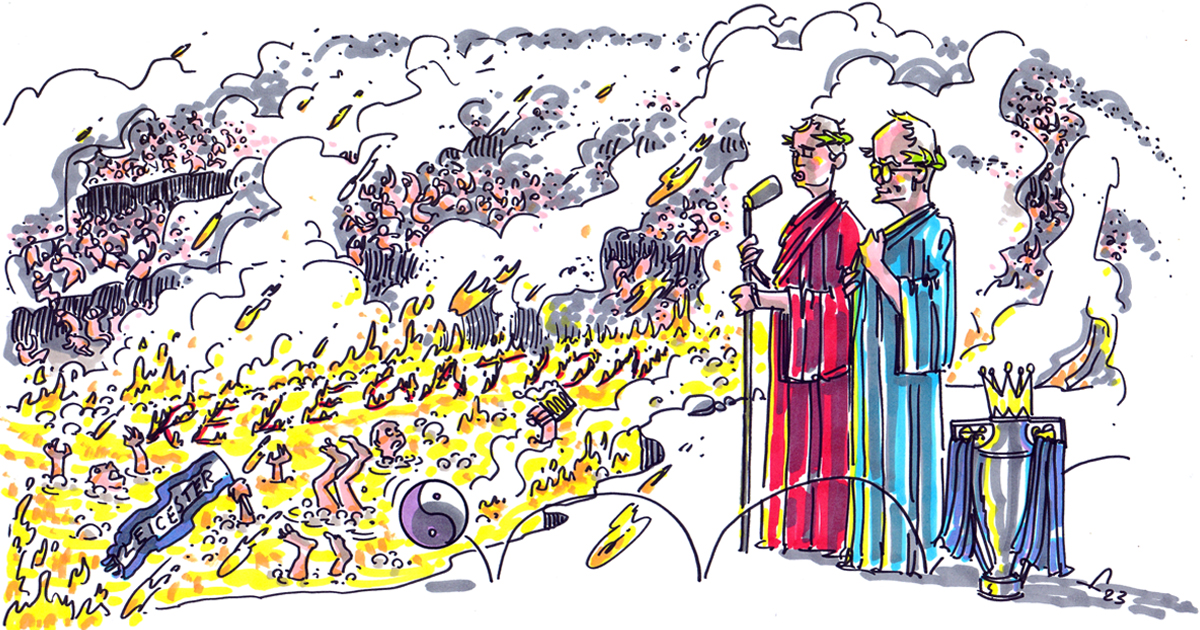I have always been a “you make your own luck” type of personality, whereas Karma is something I’ve only grown to appreciate much more as I’ve gotten older.
The co-founder of our startup client, Spuma, is a very young man of astonishing calm in that most stressful of journeys; building something of value from scratch. I have never seen him get angry or agitated, and he will tell me that it’s because he believes fully in good karma.
It all comes around, and you get back, in equal doses, all the positive or negative energy you offer the world.
There is so much to learn from young blood, when you drop your middle-aged ideas and ego. Every day is a school day.
When one spends any time reflecting on the Eastern philosophy of karma and Taoism, there are interesting parallels with the biblical teachings of “reap what you sow” – Galatians 6:7–9
Christianity as a dogma does not teach, or indeed approve, karma, but I think that needs more theological thought, as our foundation concept of “grace” is maybe not so distant. Some say it’s the complete opposite, but I don’t agree.
It’s a cool debate I could see myself having some barmy evening in Sausalito, overlooking the water, with the help of some fine wine, or something heavier. In the book, Bono: in Conversation with Mishka Assayas, the U2 singer commented:
I’d be in big trouble if Karma was going to finally be my judge… I’m holding out for grace. I’m holding out that Jesus took my sins onto the Cross…
That’s the kind of line that invariably lights my fire. Shivers down the spine at that sentence. Here is some more from him:
Have you come here for forgiveness?
Have you come to raise the dead?
Have you come here to play Jesus
To the lepers in your head?
I try and imagine the thrill of the artist when that genius verse comes into focus, and onto paper.
But I digress badly. Forgive me. When you have fewer “tomorrows” than “yesterdays”, you find these thoughts evermore dominating your brain.
Karma, of course, as opposed to Bono’s “grace”, works both ways, as Leicester City are deliciously finding out.
My personal satisfaction at seeing this club’s ”Giudizio Universale” is neither sporting nor edifying, but it feels right to me. They may yet avoid relegation from the English Premier League, but I do hope they don’t.

I sense that the die is cast. And it was, a long time ago.
Only once on our podcast AYNE have I had my two co-hosts earnestly slap me down for taking the chippiness “way too far”. When we interviewed BBC golf correspondent Ian Carter, the resultant overly aggressive conversation, that had to be severely edited, was not because we disagreed over LIV golf (who cares really?). It was because he is a fan of this Midlands club. Ian, completely understandably, was justifying the sacking of Claudio Ranieri as needed, and timely, to avoid relegation. He claimed most fans at the time agreed that a change was necessary to avoid the drop.
I felt that, after all he had done and still being in the Champion’s league, such disloyalty was a damned disgrace.
The exchange degenerated, in a way very common in the passions of football.
Everyone agrees Leicester winning that title should be considered as one of the very greatest sporting fairytales of all time. So my position was, and is, that Ranieri was owed a level of loyalty and gratitude way beyond the everyday realities of a relegation battle the next year. Relegation battles are a reversion to “mean” for Leicester.
Loyalty is all, as my old man always said, and this is a very thick red line for me.
Ultimately, Leicester is a marginal club, and always has been. Few care about them; they are drab, with only one interesting exception, Frank Worthington. The talented maverick centre-forward, who should have won 50 England caps, was wanted by Liverpool in 1972, but failed the medical, over high blood pressure. Mr Shankly, who knew a player, was undeterred and told Frank to have a holiday to rest up, and then re-sit the test. Frank’s “break” consisted of 7 days of heavy drinking involving two blonde Swedish females, a night with Miss Great Britain, and an encounter with another woman at the airport. He did re-sit the medical on his return, but unsurprisingly the blood pressure was even higher.
Frank Worthington blew his chance of a serious career, and had to make do with the nothing team, Leicester, who then signed him.
Claudio Ranieri joined Leicester in 2015, taking over a club that had narrowly avoided relegation the previous year. Reversion to the “mean” indeed. The only other famous “ex” of the club, the virtue-signalling Gary Lineker, commented on the news with an in-character populist take:
Claudio Ranieri, Really?
Few, in fact, expected this honourable old Italian coach to do much. He was considered a nearly-man loser, the eccentric Tinkerman, someone likely just too nice to ever succeed.
The main attributes of Taoism are simplicity, patience and compassion, and this describes the Testaccio man perfectly. He was a fine coach and man who, karma would say, was due a juicy reward for a career of great work.
We all know the story of what happened next, that amazing year. Those two AYNE co-hosts of mine live for the “truth” of sport that Ranieri delivered, and they are right. It’s the pinnacle of what sport can do. It’s pure and glorious.
In tribute, it is worthy of the very best because Nessun Dorma (No one sleep)
Look at the pride and dignity of Ranieri. He quietly contemplates something he knows should not have happened. It is a misalignment of how things should be. It’s an outlier, several standard deviations from reality. He even gets the divine Bocelli in a Leicester shirt, and still they can’t stay quiet.
It truly is pearls before swine. And then they sack him 6 months later.
The ugliness, even today, of writing that chronicle of events is still jarring.
So, for me, how can any decent person, let alone a true sports disciple, condone what the grey, grey journeyman club of Leicester did to Claudio? For something they’d seen a million times; a relegation battle. I just can’t.
It’s 7th circle of hell stuff for me.
Karma is indeed a bitch, telling us that everything, yes everything since, was written the day those people betrayed Ranieri.
The Sunday Column today however wants to try and make a case for Ian Carter’s opinion that Ranieri had to go. A “pro” argument that needs to ignore the spiritual beauty and emotion that is sport.
Relegation is just so big a cost, so unthinkable a destiny, so terminal a financial outcome, that it justifies the most horrific of disloyalty. Discuss!
The biggest debate in European sport today is over open versus closed leagues. On the podcast, and this Column, I have put it on the table many times. I fully realise that it is a topic that finds overwhelming support for the former; for several reasons. Open leagues deliver the liquid gold of those raw emotions that Ryan Reynolds felt last month; the monetary value and interest of the death-match jeopardy at the bottom, in May; the coherence that fully rewards and punishes athletic performance to the very end.
Surely there is no debate?
But there is.
Anyone who truly understands, ideally from direct experience of the inside, the pressures that relegation brings, knows that it generates a whole series of unintended consequences.
Shortermism is the bane of sport, causing a series of decision-making that is truly sub-optimal, under the panic of the drop. Ranieri is only the most obvious example. There is, under open leagues, little chance for a football or rugby club to put in place the kind of longterm structures that are so needed to make our sports sustainable. The risk of relegation is a factor in the whole money-up-front thinking, that prevents a more direct B2C relationship with fans, and guarantees appalling decisions around players and coaches. Let’s remember Sunderland Till I Die, when the new owner tragically paid absurd sums for a player on deadline day. How long is the average tenure of a coach these days?
The cost of keeping the tradition of relegation is crippling. Just killing sport.
So we can’t have it both ways. And, at some point, we have to work out a solution to all this. Do we want a semblance of stability with which to build a healthy industry, or do we want to keep relegation as our raison d’être, because it is who we are; cost what it costs?
This is, IMHO, undoubtedly, the Rubicon in sport. Our biggest decision.
I was speaking to my editor the other day. He is a professional writer, but also a football man. He said to me about a passage in my book that he thinks needs removing:
Sometimes we need to kill our darlings.
Definition: to get rid of an unnecessary storyline, character, or sentences you may have worked hard to create but that must be removed for the sake of your overall story.
Ian Carter is saying that Claudio was a “darling” that needed whacked. So, he is right.
But, mamma mia, he is also so so wrong.
The example of Ranieri is the Sophie’s Choice for sport; an impossible triage.
Do we want to keep relegation and allow such abominations? Or do we finally let go of the tradition of open leagues?
I am not deaf to either side of the debate and can understand opinions. But I can not condone not grasping this nettle at all, and hoping it just goes away.
Leadership is never easy.

Listen to our “Are you not entertained?” sports management podcast here.
Let us also recommend our wonderful colleague John WallStreet. His daily newsletter here is essential reading, especially in its coverage of the US market.
To find out what we do in change management, have a look here.
For our C-suite management services, read here.
Here you can know more about our content development work.
Discover our Corporate Learning service.
Get to know more our “Sport Summit Como” yearly sports management event here.
If you are interested in our own story, check us out here.



